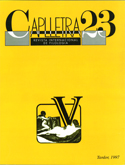La polifonia de gèneres i d'estils en «Tirant lo Blanch» i el problema de la seva adequada traducció al rus
DOI:
https://doi.org/10.7203/caplletra.23.7298Keywords:
Tirant lo Blanch, traducció al rus de Tirant lo Blanch Abstract
Abstract
In respect to the Batkinian approaches on the creation of the novel, Maria A. Abràmova uses the opposition between Utopia and reality to highlight the modernity of a work such as Tirant lo Blanch. The episode on which she bases her analysis is the appearance of King Arthur in a cage during the celebrations in Constantinople and the similarities between this and Guillem de Torroella's Faula. In the second part of the study, the Russian philologist considers the difficulties of adapting the language and the cultural issues of the medieval Catalan universe which is completely different from the Russian tradition. Therefore she proposes that the translators base their task on models of previous medieval Catalan translations, which is impossible to carry out, since there are no such translations from Catalan into Russian. In this case the solution appears to be the adoption of similar criteria as in the translation from French into Russian, although this may have several disadvantages.
 Downloads
Downloads
Downloads
Published
How to Cite
-
Abstract273
-
PDF (Català)138
Issue
Section
License
Authors submitting work to Caplletra for publication must be the legitimate holder of the usage rights. Legitimacy for the purposes of publishing the work must also include images, tables, diagrams and any other materials that may complement the text, whether they are the author of such material or not.
Copyright: on publishing their work in the journal, the author grants Caplletra. Revista Internacional de Filologia usage rights (reproduction, distribution and public communication) for both the paper printed version and for the electronic version.
All work published in Caplletra is covered by the Creative Commons license type Attribution-NonCommercial-NoDerivatives 4.0 (CC BY-NC-ND 4.0).
RESPONSABILITY
Caplletra. Revista Internacional de Filologia does not necessarily identify with the points of view expressed in the papers it publishes.
Caplletra. Revista Internacional de Filologia accepts no responsibility whatsoever for any eventual infringement of intellectual property rights on the part of authors.






